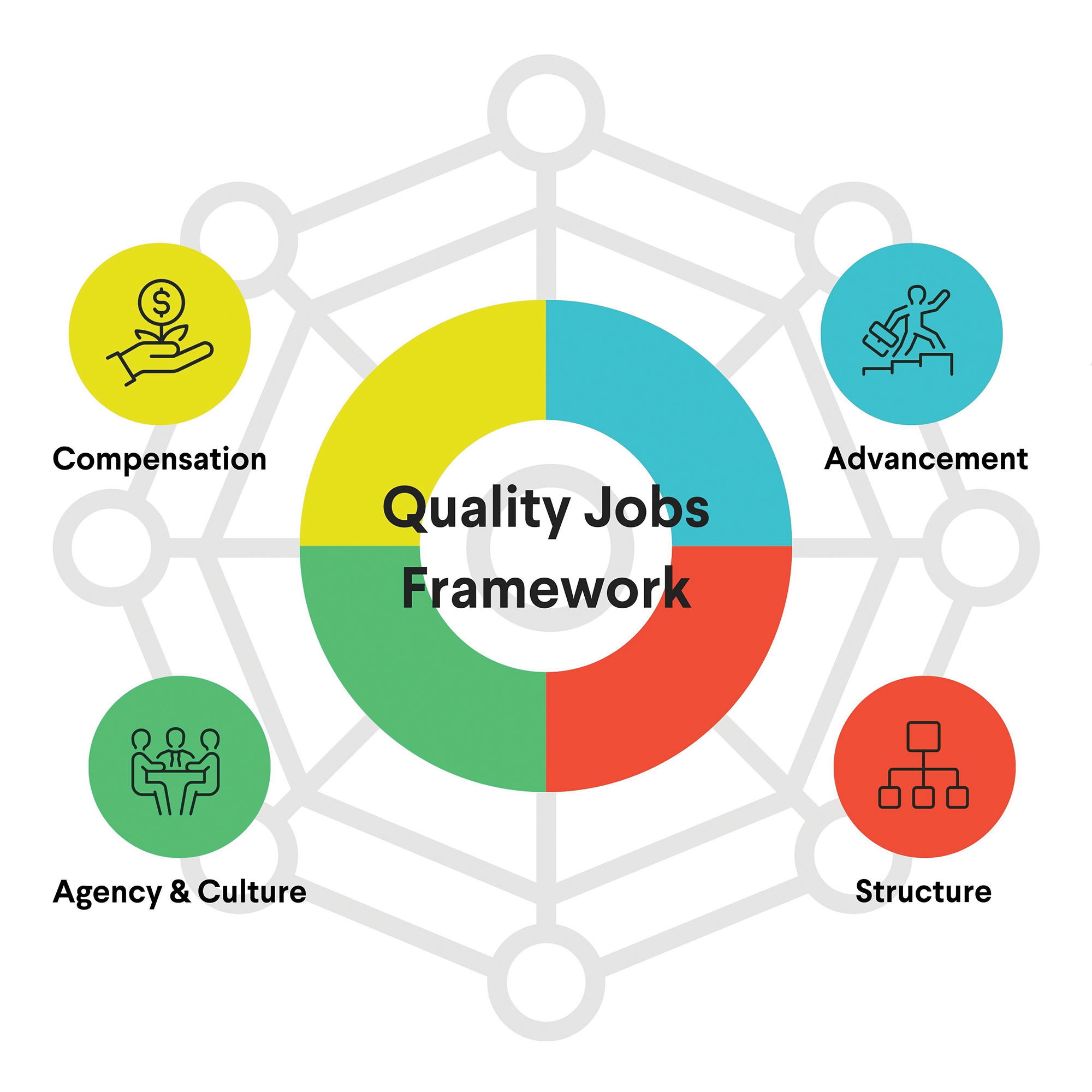
Our North Star: Quality Jobs for 75 Million People
Join us to drive economic success for people, businesses, and communities.

August 29, 2023
JFF’s framework spells out new standards for quality jobs and actions we can all take to improve job quality—and ultimately help millions more people advance in the economy.
How to use this framework:
Explore the key elements of quality jobs.
Apply the framework to your specific work and context.
Center workers’ voices and integrate their perspectives.
Collaborate with partners, use framework as a catalyst.
Evaluate your impact on job quality outcomes.
More than half of the people in the U.S. labor force—92 million workers—are stuck without quality jobs and face barriers to advancement. We must do better—and, together, we can.
Jobs for the Future’s Quality Jobs Framework provides an updated comprehensive definition of a quality job that highlights what all workers need in addition to competitive pay and benefits—stability, opportunities for learning and career growth, and a safe, supportive, and engaging work environment.
While the framework focuses on what employers, industry leaders, policymakers, and government agencies can do to improve job quality, it also serves as the basis for identifying actions everyone throughout the learn-and-work ecosystem can take to help millions more people move into quality jobs and advance economically.
At JFF, we believe this framework will play a crucial role in rallying our partners to join us in achieving our recently announced North Star goal: In 10 years, 75 million Americans facing barriers to economic advancement will have quality jobs.
It won’t be easy. Of the occupations projected to see the fastest growth between 2021 and 2031—including frontline positions in health care and the service and transportation industries—nearly half are of low quality. And there are far too many jobs with little opportunity for career or economic advancement that employers could make into quality jobs but don’t.
We must encourage concerted efforts throughout the economy to create new quality jobs and make them accessible to people of all educational backgrounds and life experiences. And we must persuade employers to transform more jobs into quality jobs—a process they can undertake with additional guidance from JFF’s Impact Employer Model, which outlines how employers can update their strategies for attracting, developing, and retaining talent by prioritizing the social and economic well-being of employees.
Employers can’t do it alone. This work requires a movement, and we all have a role to play. Industry groups, policymakers, and government agencies are key to creating millions more quality jobs, and we call on all of them to take concrete steps detailed in the Quality Jobs Framework.
Leaders throughout the broader learn and work ecosystem must also take direct action to promote meaningful and lasting improvements in job quality. This includes state and local workforce boards, educational institutions and training providers, community-based organizations, funders, agencies at all levels of government, and—always—workers, themselves.
Read the Quality Jobs Framework and begin taking action to improve job quality in your community and across the country.
For more information, contact Molly Blankenship at mblankenship@jff.org.


All forms of pay, benefits, and leave that enable all workers to support themselves and their dependents at the local cost of living.
Actions
• Pay all workers at least a living wage that covers the local cost of living, providing additional benefits to mitigate the potential for wage increases to result in a loss of public benefits.
• Periodically review and adjust wages for all workers to reflect changes in the local cost of living.
Drivers of Change
• Employer practice
• Industry practice
• Policy change
• Policy enforcement
Living Wage Calculator, Massachusetts Institute of Technology, https://livingwage.mit.edu/
Actions
• Automatically enroll all part-time and full-time workers in comprehensive benefits plans within 30 days of employment and provide any needed navigation support.
• Develop a benefits package for all workers that includes health, dental, and vision insurance, as well as a retirement savings plan with an employer match.
• Ensure that health care coverage meets federal Affordable Care Act standards for affordability, minimum value, and essential services.
Drivers of Change
• Employer practice
• Industry practice
• Policy change
• Policy enforcement
Actions
• Provide all workers with a minimum of 6 weeks of paid family and sick leave.
• Provide all workers with a minimum of 15 additional paid vacation days per year.
Drivers of Change
• Employer practice
• Industry practice
• Policy change
• Policy enforcement
Actions
• Regularly audit the total pay and benefits packages for all workers and actively address any disparities to ensure fair, transparent, and equitable compensation processes.
• Provide clear and easily accessible information to all workers about compensation and benefits, including pay ranges and criteria.
Drivers of Change
• Employer practice
• Industry practice
• Policy change
• Policy enforcement

The policies and practices that provide all workers with equitable opportunities to grow their skills, knowledge, and careers within their organization or industry.
Actions
• Base hiring and promotion decisions on skills and competencies, rather than on traditional criteria such as educational credentials, years of experience, and company tenure.
• Design jobs that provide challenging and meaningful work that utilizes workers’ skills, and encourage workers to pursue ongoing professional development.
Drivers of Change
• Employer practice
• Industry practice
Actions
• Develop clear and well-defined career pathways that outline the skills, experience, and competencies required to advance within the organization or industry.
• Regularly and transparently communicate career pathway opportunities to all workers.
Drivers of Change
• Employer practice
• Industry practice
Actions
• Provide tailored coaching and training opportunities to help all workers develop the skills and competencies they need to advance.
• Ensure that all workers receive professional development and training opportunities that lead to credentials or certifications that hold local and/or national labor market value.
• Provide or connect all workers with financial resources to remove barriers to their participation in professional development and training programs.
Drivers of Change
• Employer practice
• Industry practice
Actions
• Prioritize internal advancement by filling job openings from within whenever possible.
Drivers of Change
• Employer practice
• Industry practice
• Policy change
• Policy enforcement

The extent to which all workers are encouraged and supported to use their expertise to drive change within their organization and have a sense of belonging and value in the workplace.
Actions
• Cultivate a supportive work environment that fosters a sense of belonging, value, and respect for all workers.
• Build processes to ensure that all workers are recognized and appreciated for their contributions.
Drivers of Change
• Employer practice
Actions
• Ensure that all workers have access to transparent and responsive support on workplace issues, such as pay, benefits, and conflict resolution.
• Clearly communicate workers’ rights and responsibilities and ensure that all feel comfortable seeking help or support when needed.
Drivers of Change
• Employer practice
Actions
• Support the right of all workers to organize collectively without fear of retaliation or discrimination.
Drivers of Change
• Employer practice
• Industry practice
• Policy enforcement
Actions
• Encourage and empower all workers to provide input into the development of their role and organizational decisions that affect the employee experience.
• Intentionally provide opportunities for all workers to share their ideas, suggestions, and expertise without fear of retaliation or discrimination.
Drivers of Change
• Employer practice
Actions
• Prioritize DEI practices to address systemic barriers to advancement and ensure equitable treatment of all workers.
• Ensure that DEI commitments and accountability result in a diverse staff and management team that reflects the demographics of the communities and customers the organization serves.
Drivers of Change
• Employer practice
• Industry practice

The foundational elements that support a safe, healthy, and stable environment for all workers.
Actions
• Ensure compliance with all state and federal laws regarding workplace health and safety, including anti-discrimination and anti-harassment policies.
• Provide reasonable accommodations to all workers with disabilities in accordance with federal law.
Drivers of Change
• Employer practice
• Industry practice
• Policy enforcement
Actions
• Create processes for all workers to provide input into their schedules.
• Ensure that full-time workers do not exceed 50 hours a week on average annually and receive overtime pay in accordance with state and federal labor laws.
• Provide all workers with their schedules and work locations 3+ weeks in advance and implement policies and practices to prevent last-minute changes.
• Provide workers with the option to work remotely for at least part of their workweek, if feasible within their job responsibilities.
Drivers of Change
• Employer practice
• Industry practice
• Policy enforcement
Actions
• Properly classify all workers as employees, independent contractors, or other relevant categories, based on clear and transparent criteria and in accordance with federal law.
• Ensure that all workers receive relevant benefits and protections based on their classification.
Drivers of Change
• Employer practice
• Policy enforcement
Actions
• Implement policies and practices that protect all workers from arbitrary or discriminatory discipline or dismissal.
• Ensure the equitable application of all policies.
Drivers of Change
• Employer practice
• Policy change
• Policy enforcement

Join us to drive economic success for people, businesses, and communities.

Prepare your company for the future of work by putting talent first. About Impact Employers Impact Employers take a fundamentally different approach to attracting, developing, and retaining talent—they prioritize the social and economic well-being of…

A new survey from Jobs for the Future and Morning Consult highlights worker sentiment on quality jobs. The poll was conducted by Morning Consult on August 12-13, 2023, among a sample of 2,199 adults.…